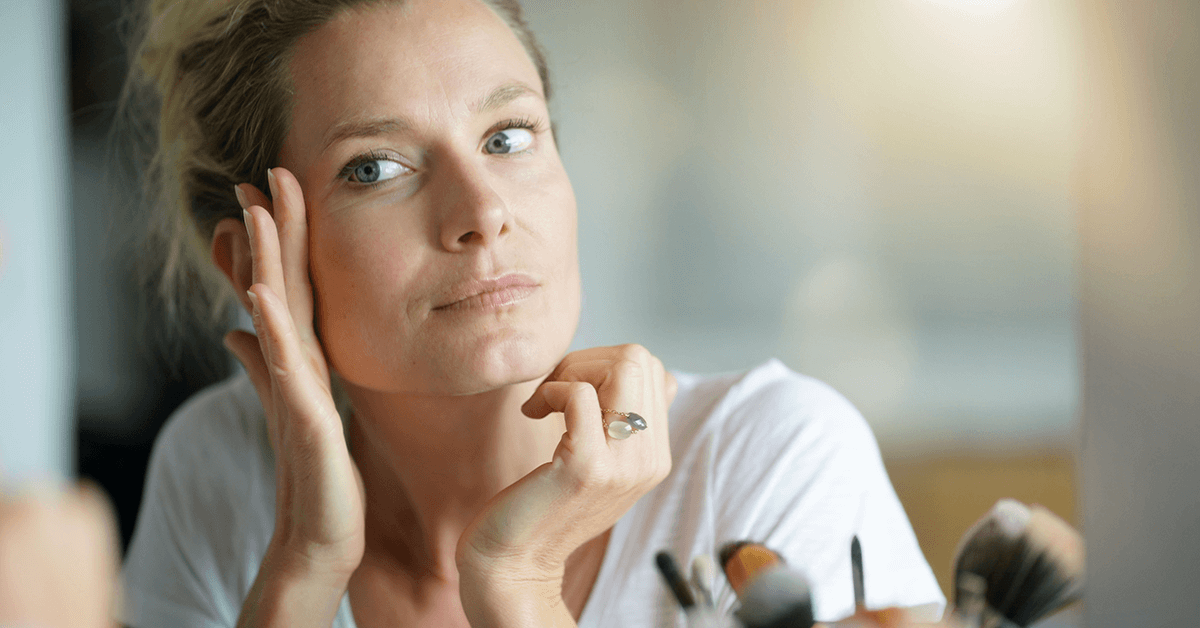Use the player to listen to the article and/or continue to read below.
Negative Effects of Sleeplessness | Symptoms | Prevention
Introduction
A restorative night’s sleep is vital for your overall well-being, but what about your appearance? How much validity is there to beauty sleep?
The benefits of having enough sleep are undeniable. Most adults require between 7 and 9 hours of restorative sleep to look and feel their best. Good sleeping habits can reduce the adverse effects associated with sleep deprivation.
A 2010 study compared two photographs of 23 subjects. Participants were photographed after a typical night’s sleep (eight hours) and after sleep deprivation (31 hours of wakefulness after a night of reduced sleep).
The photographs were presented in randomized order and rated by untrained observers. Findings show that sleep-deprived people appear less healthy, less attractive, and more tired than when they are well-rested.[1]
How Sleeping Improves Aesthetics
Beauty sleep is not a cliché. Getting enough sleep has restorative powers that can directly affect your appearance.
Sleep promotes healing and restoration of blood vessels. It energizes your body, helping you look better on the outside.
Conversely, insufficient sleep can lead to physical and mental health problems that make you look drained and your skin dehydrated and listless. Chronic sleeplessness can lead to wrinkles and weakened skin elasticity.
A South Korean study revealed that after one night of sleep deprivation, multiple skin biophysical parameters showed changes when compared to the baseline measurements, including a decrease in skin hydration and elasticity, enlarged pores, and impaired barrier function.[2]
Negative Effects of Sleeplessness
Many adults nowadays suffer from sleep deprivation due to a heavy workload, medical conditions, and other factors. Individuals who work shift work are especially prone to inadequate sleep due to fluctuations in their circadian rhythm, or biological clock.
Circadian Rhythm Sleep Disorders (CRSDs) arise from a chronic or recurrent pattern of sleep and wake disturbance that is due to dysfunction of the circadian clock system, or misalignment between the timing of the endogenous circadian rhythm and externally imposed social and work cycles, that result in clinically significant functional impairments.[3]
1. Weakened Immunity
Too little sleep weakens your defenses against harmful bacteria and viruses that try to invade your body. It makes you prone to illnesses and disease; therefore, you are more likely to get sick when exposed to these germs if you are sleep-deprived.
2. Increased Incidence of Accidents
Not having enough sleep can cause daytime sluggishness, making you more accident-prone and increasing your risk of being in a car accident. If you sleep well, your mind can concentrate better on everyday tasks, making it easier to function throughout the day.
3. High Blood Pressure
If you’re sleeping less than five hours, you are at risk of hypertension. Sleep helps your blood regulate stress hormones, which are essential for your nervous system. Over time, a lack of sleep can cause chronic fatigue and lead to high blood pressure.
4. Weight Gain
Sleeplessness results in the release of ghrelin, which is a hormone that leads to increased feelings of hunger. Try to recall the last time you had a sleepless night, and how it affected your appetite the next day.
Now, your sleepless-hunger situation becomes even stickier because your body releases less leptin, which is a hormone that controls your appetite. Before you know it, you’re ravenously tearing into a box of chocolate snack cakes because your body is confusing exhaustion for hunger.
5. Memory Issues
When you’re sleeping, your brain forms connections that help register and process information. It enables you to process and retain new information. Insufficient or inadequate sleep will negatively affect your ability to form short-term memories.
Symptoms
- Frequent Yawning
- Irritability
- Daytime Fatigue and Sluggishness
- Dark Under-Eye Circles
- Dull Skin
- Breakouts: Acne, Eczema, Psoriasis, and Skin Allergies
- Low Energy Levels
- Poor Concentration
- Headache
Prevention
- Limit Daytime Naps
- Avoid Drinking Caffeine Close to Bedtime
- Go to Bed on Time
- Do Not Eat Heavy Meals Before Bed
- Reduce Alcohol Intake
- Exercise Regularly
- Avoid Using Your Phone at Night
- Establish a Sleeping Schedule
Conclusion
Restorative sleep can help you look and feel healthier. Aesthetics aside, sleeplessness can affect your well-being and longevity. If you feel that you aren’t getting the quality sleep you deserve, contact your primary care provider.
References:
- Axelsson, John et al. (2010). Beauty sleep: experimental study on the perceived health and attractiveness of sleep deprived people. British Medical Journal. https://doi.org/10.1136/bmj.c6614
- Kim, M. , Kim, E. , Kang, B. and Lee, H. (2017) The Effects of Sleep Deprivation on the Biophysical Properties of Facial Skin. Journal of Cosmetics, Dermatological Sciences and Applications, 7, 34-47. doi: 10.4236/jcdsa.2017.71004.
- American Academy of Sleep Medicine. (2005). International classification of sleep disorders. Diagnostic and coding manual, 51-55. https://www.ncbi.nlm.nih.gov/pmc/articles/PMC3523094/






